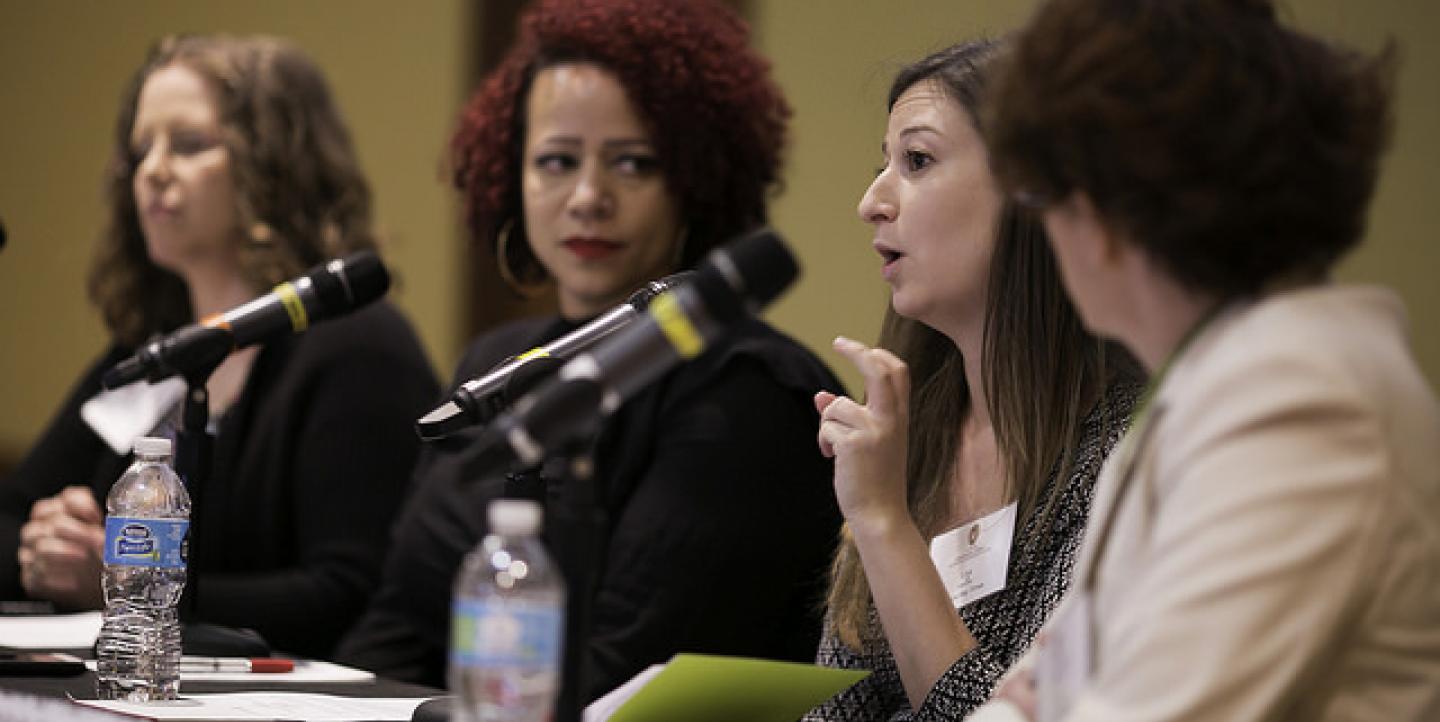A group of international media professionals penned an open letter calling for an end to sexism in the industry, which includes 14 actionable steps toward greater equality and inclusion.
Industry leaders such as Mariana Santos, former ICFJ Knight Fellow and founder of Chicas Poderosas, and Yusuf Omar, an IJNet contributor and co-founder of Hashtag Our Stories, came together to pen the letter. Joyce Barnathan, president of ICFJ — IJNet’s parent organization — was a signatory as well.
The recommendations were a response to sexist incidents at this year’s World Association of Newspapers and News Publishers (WAN-IFRA) congress in Lisbon, Portugal. The stark disparity between productive sessions on gender issues such as the Women in News Summit and sexist onstage actions sparked an outrage. (WAN-IFRA officials apologized for the incidents and after the conference highlighted ongoing efforts to diversify its leadership; see Editor’s Note below.)
“It’s time to stop talking about the need for equality and start actively reforming the industry,” the letter states.
These 14 steps to improve gender equity and equality can be applied to any news organization or conference organizer.
1. Push back when articles, sources or events do not include an adequate number of women’s voices or contributions. Women are underrepresented in media leadership positions, so speak out when you have the opportunity and call out any time your organization contributes to the problem.
2. Use data to track representation on panels and in leadership, and use this information to drive change. You may think gender inequality is not a problem at your organization, but tracking it is the only way to be sure. (Read about/listen to Joanne Lipman’s approach to leveraging data in the cause. Check out the BBC’s 50:50 gender balance challenge created by Ros Atkins, and see the toolkit produced by Gender Avenger). Consider sharing these metrics to be transparent and held accountable, which can help build trust in your organization.
3. Call out sexual harassment (on and offline) and address it through clear and detailed policies. Press Forward has resources for dealing with harassment, and Julie Posetti has created a step-by-step guide for managing it in newsrooms.
4. Place gender equality initiatives front and center and do not treat them as a bonus or afterthought.
5. Organize a gender-inclusive conference. This includes more spotlight roles for women, but also consulting women on other needs that are often overlooked, such as free childcare.
6. Insist that your partner organizations and contributors abide by principles of gender equality. Make sure that policies and codes of conduct are clearly established and easily accessible to all organizations and individuals involved.
7. Sponsors, provide funding or bonuses contingent on a set of gender equality standards for conferences, events and content. Standards could include a quota for women speakers and moderators, and they should be clearly communicated and enforced.
8. Share platforms and opportunities by encouraging partner organizations to nominate women speakers or encouraging senior, male executives to give their seat to more junior women. “Experience grows from opportunity,” the letter states.
9. Educate team members on the intricacies of conversation culture, including the male dominance of panels and meetings, and a tendency to interrupt women speaking. Instead, be mindful and amplify women’s voices.
10. Actively work to eliminate bias from hiring and selection processes. This will not come naturally.
11. Encourage sponsorship from the top. Achieving gender equality can’t happen as a grassroots initiative. Without support from leaders, gender initiatives will pop up and peter out. Men sponsoring talented women for promotion is one of the best ways to set an example for management and build diversity into leadership. Adam Grant has some great advice on how to do this.
12. Redesign systems for assigning raises. Give raises to those who deserve them, rather than those who demand them, since women are less likely to negotiate for higher pay.
13. Respect the pace at which women choose to advance their careers. Do not assume that because a woman passes on a promotion or takes time to focus on her family that she will never be ready to climb the ranks or increase her contribution.
14. Apply all of the above to diversity more broadly. This includes race, class, and sexual orientation.
To add your name to the list of signatories — regardless of your gender — please do so here.
Editors’ Note: When asked for comment, Vincent Peyregne, CEO of WAN-IFRA, released the following statement: “Inappropriate incidents on stage in Portugal have been addressed by WAN-IFRA in many forums including at the conference, on social media, on our website and with our staff. They are contrary to our values and are unacceptable,” Peyregne said in part. “We will continue to use our position to push for change from within the industry.” Click here to read his full statement.
Main image CC-licensed by Flickr via UW Madison CJE.


